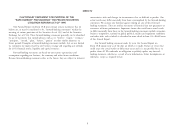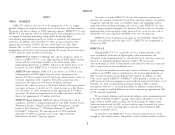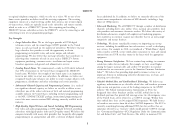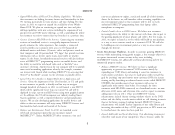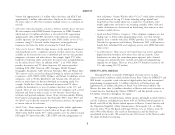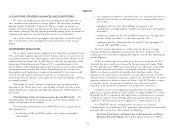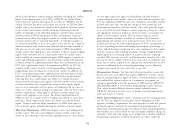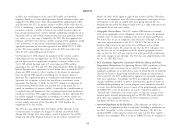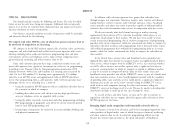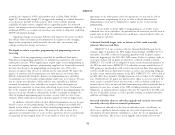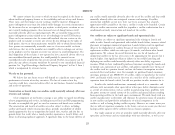DIRECTV 2010 Annual Report Download - page 33
Download and view the complete annual report
Please find page 33 of the 2010 DIRECTV annual report below. You can navigate through the pages in the report by either clicking on the pages listed below, or by using the keyword search tool below to find specific information within the annual report.DIRECTV
ACQUISITIONS, STRATEGIC ALLIANCES AND DIVESTITURES • the assignment of frequencies and orbital slots, the relocation of satellites to
different orbital locations or the replacement of an existing satellite with a
We review our competitive position on an ongoing basis and, from time to new satellite;
time, consider various acquisitions, strategic alliances and divestitures, including
potential wireless broadband investments or alliances, in order to continue to • compliance with the terms and conditions of assignments and
compete effectively, improve our financial results, grow our business and allocate authorizations, including required timetables for construction and operation
our resources efficiently. We also consider periodically making equity investments in of satellites;
companies with which we can jointly provide services to our subscribers. • avoidance of interference by and to DBS/DTH operations with operations
For a further discussion of our mergers and acquisitions, see Part II, Item 8, of other entities that make use of the radio spectrum; and
Note 3 of the Notes to the Consolidated Financial Statements of this Annual • compliance with the Communications Act and FCC rules governing U.S.-
Report. licensed DBS and DTH systems.
GOVERNMENT REGULATION The FCC grants authorizations to satellite operators that meet its legal,
technical and financial qualification requirements. The FCC conditions such
We are subject to government regulation in the United States, primarily by the authorizations on satisfaction of ongoing due diligence, construction, reporting and
FCC, and similar regulatory agencies in Latin America and, to a certain extent, by related obligations.
the legislative branches, other federal agencies, and state and local authorities in the
countries where we operate. We are also subject to the rules and procedures of the All of our satellites and earth stations are or have been licensed by the FCC.
International Telecommunications Union, or ITU, a specialized agency of the Currently, two of our satellites are licensed by the government of Canada. While
United Nations within which governments and the private sector coordinate global the FCC generally issues DTH space station licenses for a fifteen-year term, DBS
telecommunications networks and services. Depending upon the circumstances, space station and earth station licenses are generally issued for a ten-year term,
noncompliance with legislation or regulations promulgated by these entities could which is less than the useful life of a healthy direct broadcast satellite. Upon
result in the suspension or revocation of our licenses or registrations, the expiration of the initial license term, the FCC has the option to renew a satellite
termination or loss of contracts or the imposition of contractual damages, civil fines operator’s license or authorize an operator to operate for a period of time on special
or criminal penalties. temporary authority, or decline to renew the license. If the FCC declines to renew
the operator’s license, the operator is required to cease operations and the
This section sets forth a summary of regulatory issues pertaining to our frequencies it was previously authorized to use would revert to the FCC.
operations in the United States and is not intended to describe all present and
proposed government regulation and legislation affecting the MVPD industry or Currently, we have several applications pending before the FCC, including
our business. applications to launch and operate future satellites to support DIRECTV’s services.
In general, the FCC’s approval of these applications is required for us to continue
FCC Regulation Under the Communications Act and Related Acts. The to expand our range of service offerings while increasing the robustness of our
Communications Act and other related acts give the FCC broad authority to satellite fleet. We may not obtain these approvals in a timely fashion or at all.
regulate the operations of our company.
As a DBS/DTH licensee and operator we are subject to a variety of
The ownership and operation of our DBS/DTH system is regulated by the Communications Act requirements, FCC regulations and copyright laws that could
FCC primarily for: materially affect our business. They include the following:
• the licensing of DBS and DTH satellites, earth stations and ancillary •Local-into-Local Service and Limitation on Retransmission of Distant
authorizations; Broadcast Television Signals. The Satellite Home Viewer Act (‘‘SHVA,’’
11


